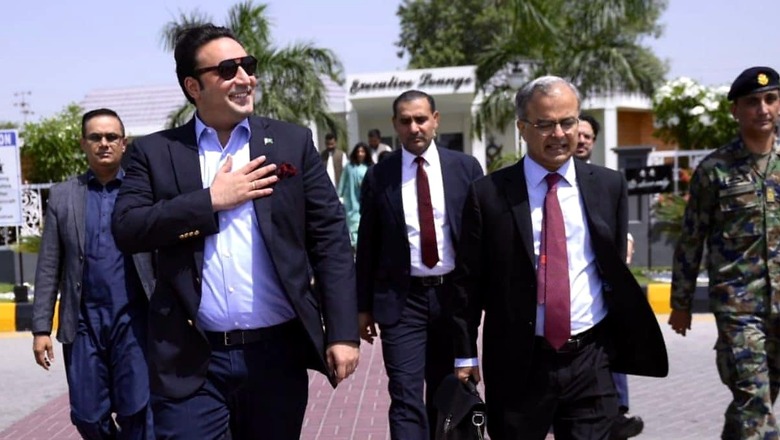
views
At a cursory glance, Pakistan Foreign Minister Bilawal Bhutto Zardari doesn’t seem to be a bad speaker. That’s the impression one gets while listening to an “exclusive” interview he gave to a news channel during his recent India visit. However, to make an impression out of it would be naïve and hazardous, given that he chose to talk to a journalist of his choice. Still, the interview doesn’t seem to put him in good stead, further reinforcing the notion of him being an irresponsible, reckless speaker, prone to creating a foot-in-mouth situation for himself and the country he represents.
Howsoever one may be tempted to believe, the fact of the matter is that diplomacy isn’t just about talking — and even less about talking aloud; it is, in fact, more about conducting one’s affair stealthily, without garnering unnecessary attention. Bilawal should have taken a cue from his illustrious grandfather who, to his credit, had mastered the art of turning adversity to his advantage — the 1972 Shimla agreement between India and Pakistan is a case in study. Unfortunately, for Zulfiqar Ali Bhutto, the only time he could not outdo his opponent was when he met Gen Zia-ul-Haq, a more than a match for him in terms of cunningness. Gen Zia, who, if Zulfiqar Bhutto’s biographer Syeda Hameed (Born to be Hanged; 2017) is to be believed, had once rushed to clean Bhutto’s shoes after a few drops of tea fell on them, didn’t think twice in sending him to the gallows following a sham trial.
Zulfiqar Bhutto hated India and Indians. He was known for using four-letter words while speaking to an Indian across the negotiating table. But then, when needed, he had an uncanny ability to conceal this intense hatred with a smile on his face. So subtle but dangerous was his slyness that Indira Gandhi, just before the 1972 Shimla meet, was advised by RN Kao, the then R&AW chief, to “immediately count” her fingers after shaking hands with Bhutto. Yet, India’s iron lady shook his hand “in good faith, but having shaken it she forgot to count her fingers”, as former diplomat Rajiv Dogra writes much élan in Where Borders Bleed (2015). The result: India lost on the negotiable table in Shimla what it had gained on the battlefield.
It would be too much to expect Bilawal to match up to the chameleon character of his grandfather, who could admire Napoleon and Marx in the same breath without contradicting himself, who could even invoke the Quran and the Das Kapital without losing credibility. One is more often than not born with such traits. But it would not have taken much effort or training on Bilawal’s part to learn the basic language of diplomacy, to realise that the usage of terms like “butcher” for the head of a government is plain stupid, especially for someone heading the diplomacy department of a country.
Bilawal, during his United Nations speech in December last year, had called Prime Minister Narendra Modi, a democratically elected leader of India, the “butcher of Gujarat”. Even by Pakistan’s own standards, and despite its inherent anti-India-ism, this was a new low: Pakistan’s national leaders had always maintained forked tongues — one for public consumption, and another for the private. Bilawal needs to read former Pakistan Ambassador SK Lambah’s book, In Pursuit of Peace (2023), to realise how even the fiercest of India’s critics, Gen Zia, who saw Pakistan’s struggle with India in religious/civilisational terms, would invariably see of Indian visitors “to the car and discreetly place a gift for them, usually a carpet”. As former Ambassador and Pakistan expert Vivek Katju wrote in his recent Firstpost article (https://www.firstpost.com/opinion/bilawal-bhutto-should-apologise-for-his-modi-comments-ahead-of-his-scheduled-india-visit-12506552.html), referring to Bilawal’s “butcher of Gujarat” comment for Prime Minister Modi, “…Never have such obnoxious words been used by even Pakistan against an Indian prime minister.” The very fact that this comment has come from a foreign minister of Pakistan, sums up the quality (in a Machiavellian term) of that country’s current political leadership.
One can understand the naiveté of Bilawal’s foreign policy (thank God for that!) from the fact that he puts preconditions on talks with India. “Bring back Article 370 and restore the statehood of Kashmir,” he thundered in Goa. It may be good for the domestic audience, but for global optics, it’s a self-goal. He, again, could have taken a cue from his predecessors who while patronising and promoting anti-India terror outfits on Pakistani soil, never failed to invoke the need for dialogue with India. They just knew very well what the US-led West wanted to hear — and thus spoke peace just for the sake of it.
Bilawal’s best bet against India would have been his call for unconditional peace talks. There’s still a strong ‘aman ki asha’ constituency in India, though its number has been depleting over the years. It would have made the usual suspects go moist-eyed, calling for peace talks with Pakistan. Bilawal should also have realised that his grandfather could stump India in Shimla not just because of his “mujh par bharosa kijiye (Trust me)” gambit. He could outmanoeuvre India because there was — and has always been — a constituency that believed in the good Pakistani versus bad Pakistani plot; even the army versus civilian narrative had its takers. This phony understanding of Pakistan gave a civilian Prime Minister in Zulfiqar Bhutto a chance to “fool” Indira Gandhi, something which Nawaz Sharif and later the civilian avatar of Gen Pervez Musharraf repeated with Atal Bihari Vajpayee and Manmohan Singh respectively.
Here, one needs to recall the story of PN Dhar, who was with Indira Gandhi when the Shimla Accord was signed. In one of his accounts, Dhar recalled his meeting with Pakistani diplomat Aziz Ahmed in 1975. When he complimented Aziz for the Shimla feat, the latter said matter-of-factly: “It was not Pakistan’s skills but India’s strong desire for positive results that had made the summit a success.”
It is here that Bilawal failed to understand and appreciate the sagacity of the foreign policy of his predecessors. And it is on this very parameter that the Modi government must be complimented for sticking to its post-Pathankot stand. Since the terror attack on the IAF base in Pathankot in 2016, the Modi dispensation has taken a starkly different position than other Indian governments of the past: While the previous dispensation would get weak-kneed every time a fresh peace proposal would come from the other side of the border. They would take the Pakistani proposal at face value. The Modi government, in the past seven years, has avoided falling into such pitfalls, which is no mean feat given the Indian temptation to fall for peace overtures — and also the Western propensity to push for such vacuous exercises every now and then.
Be that as it may, the fact is it wouldn’t have been that easy for India had there been a Musharraf or a Zulfiqar Bhutto leading the Pakistani charge at the SCO meet in Goa. But with Bilawal at the helm, it was a kind of a walkover for India’s diplomatic team that is currently being handled quite deftly by External Affairs Minister S Jaishankar.
India should, indeed, be thankful to Pakistan for managing to have a Foreign Minister whose conduct has been largely undiplomatic, to say the least.
The author is Opinion Editor, Firstpost and News18. He tweets from @Utpal_Kumar1. Views expressed are personal.
Read all the Latest Opinions here


















Comments
0 comment